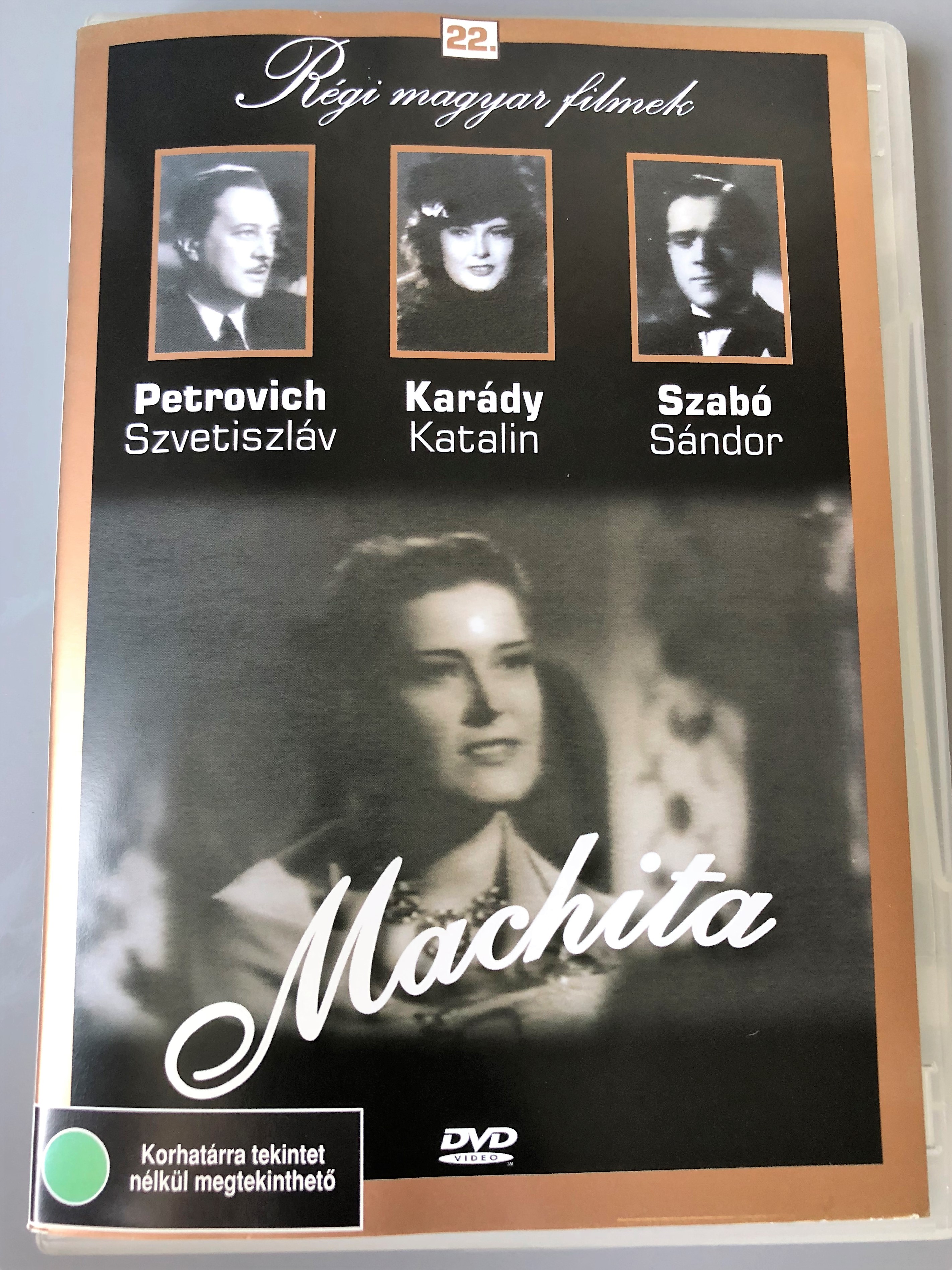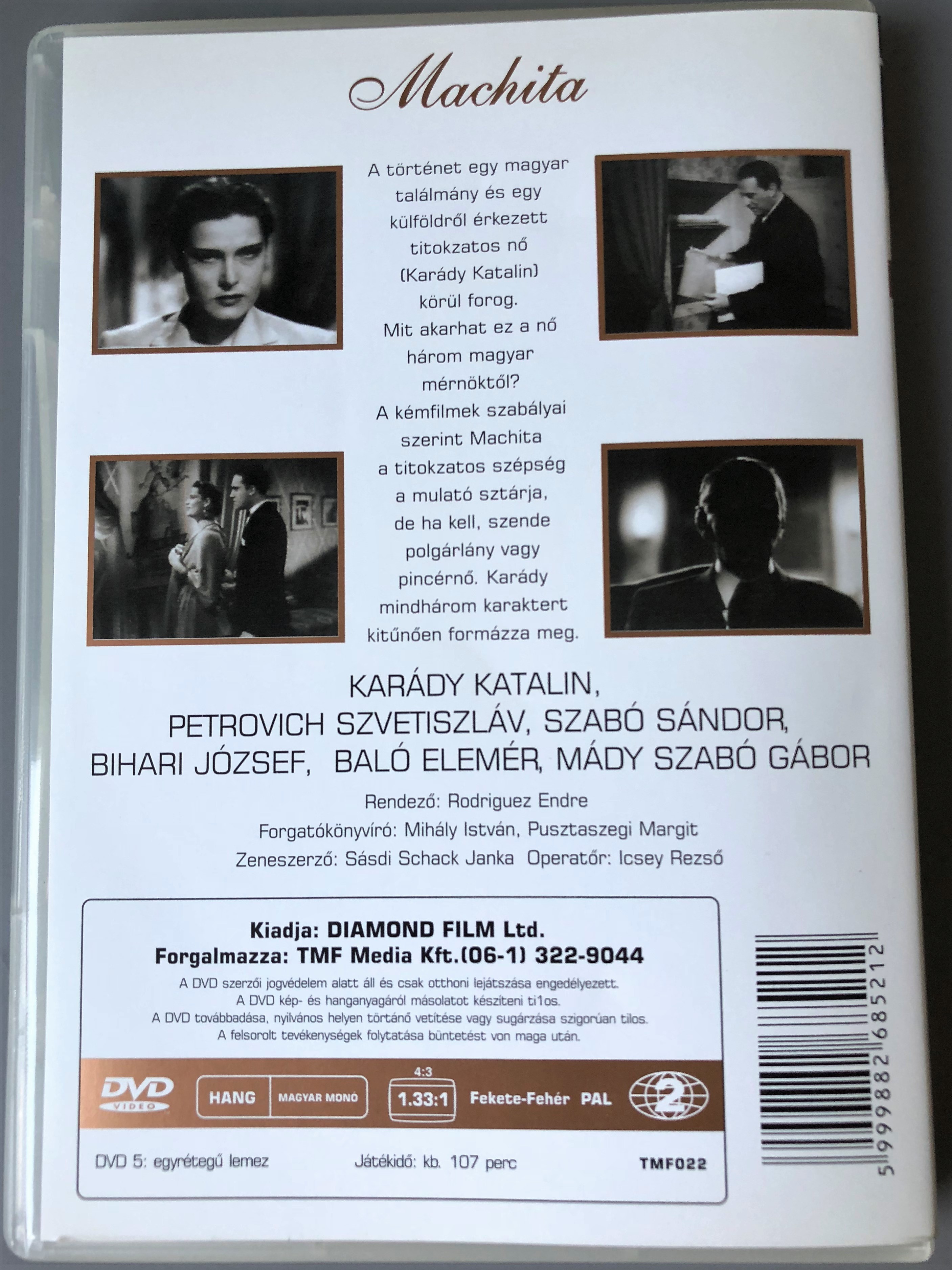Description
Machita DVD 1943 Magyar játékfilm / In 1944 this movie was BANNED in Hungary / Directed by Rodriguez Endre / Starring: Karády Katalin, Petrovich Szvetiszláv, Bihari József, Baló Elemér, Szabó Sándor / RÉGI MAGYAR FILMEK 22.
UPC 5999882685212
MADE IN HUNGARY
REGION 2 PAL Black and White
AUDIO: Hungarian mono
TOTAL RUNTIME: 107 MINUTES
Hungarian Summary:
Kémnő érkezik Budapestre, hogy megszerezze egy fontos légvédelmi ágyú tervét. Az Arizona bárban lép fel, Machita álnév alatt. A tervekhez három férfin keresztül lehet hozzáférni, Szávody igazgató úr, Kovács mérnök és Török művezető a kulcsemberek. Machita szép lassan kiveti hálóját mind három férfire. Kovács és Török könnyű préda, ám Szávody igazgató úr komplikáltabb eset. Itt nemcsak a férfi, de Machita is a szerelem hálójába kerül.
Cast / Szereplők:
Machita - Karády Katalin
Szávody György gyárigazgató - Petrovich Szvetiszláv
Török művezető - Bihari József
Kémfőnök - Baló Elemér
Kovács mérnök - Szabó Sándor
Mádi Szabó Gábor (his first movie!)
Production / Alkotók:
Operatőr: Icsey Rezső
Zeneszerző: Sásdi Schack Janka
Forgatókönyvíró: Mihály István, Pusztaszeri Margit
Rendező: Rodriguez Endre
Vágó: Katonka Lászlóné
Katalin Karády (8 December 1910 – 8 February 1990) was a Hungarian actress and singer. A leading actress in Hungarian movies made between 1939–1945, she is best known outside Hungary as an awardee of the Righteous among the Nations honorific for rescuing a number of Hungarian Jews.
After the Germans invaded Hungary her songs were banned from the radio and her new movie "Machita" (1944) was banned as well. In 1944 she was imprisoned for three months because she was suspected of spying for the enemy. She was tortured during her imprisonment before she was recued by friends of Ujszászy. Afterwards she protected several families and children.
Being a popular star of the Horthy era, there was no place for her under the new communist rule. In 1949, all of her films were banned along with her theater appearances. Only being able to work at small venues in the countryside, often with a drunk audience, she left the country in 1951 permanently. First she lived in Salzburg, Austria, then moved to Switzerland, and after a year to Brussels. In 1953, she lived in São Paulo, Brazil, opening a fashion shop. In 1968, finally receiving a visa after Ted and Robert Kennedy intervened, she moved to New York City, opening a hat salon. Performing rarely for friends only, she lived in retirement, refusing to appear in the media. Receiving a governmental invitation at her 70th birthday to return to Hungary, she only sent a hat, baffling officials. She died on 8 February 1990.
Legacy
In her home country, Karády became forgotten during the communist era and rested unknown to younger generations through the 1960s and 1970s. She was rediscovered in the early 1980s, especially due to the album Sohase mondd (1982 – Never Say) by singer/actress Judit Hernádi, that paid hommage to Karády's singing style and attitude.
The 2001 film Hamvadó cigarettavég by Péter Bacsó is dedicated to her memory. In 2004, for her courageous acts during World War II, she received the posthumous Righteous medal from the Yad Vashem Institute.


INTERSTING FACTS / READ:
Karády, Katalin
ACTOR (HUNGARY)
BORN 8 Oct 1910, Budapest - DIED 8 Feb 1990, New York City, New York
REAL NAME Kanczler, Katalin
GRAVE LOCATION Budapest: Farkasrét cemetery (22/1-1-8)
Katalin Karády was born Katalin Kanczler and grew up in poor circumstances. A charity insitution enabled her to spend several years in Switzerland and the Netherlands and back home she received an education in the field of marketing.
She married customs official Reszo Varga in 1931 after her father had died. He was 30 years her senior and a divorce followed soon. She was a beautiful girl and she took acting lessons at Ilona Aczél's acting school. During the 1930s she appeared in theatres in Budapest. Her first movie part in Halálos Tavasz ("Deadly Spring", 1939) gave her instant fame. There was a lot of gossip around her person and she had an affair with István Ujszászy, the chief of the secret service.
After the Germans invaded Hungary her songs were banned from the radio and her new movie "Machita" (1944) was banned as well. In 1944 she was imprisoned for three months because she was suspected of spying for the enemy. She was tortured during her imprisonment before she was recued by friends of Ujszászy. Afterwards she protected several families and children.
In 1945 she received word that Ujszászy had died and she broke down and was in bed for nine months. The message turned out to be false, Ujszászy was still alive at that time. After the war she returned to the theatre until 1948, but the communists made life difficult for her and in from 1949 she was only allowed to work at small theatres. In 1951 she left Hungary for Salzburg and moved to Brussels and Sao Paolo (1953) where she had a fashion shop.
In 1968 she was allowed to enter the USA and in New York she opened a hat salon. When she was invited to vosit Hungary in 1980 to celebrate her 70th birthday she only sent a hat. After she died in New York her body was returned to Hungary. After a service at the St. Stephens Basilica it was buried at the Farkasréti Cemetery.























